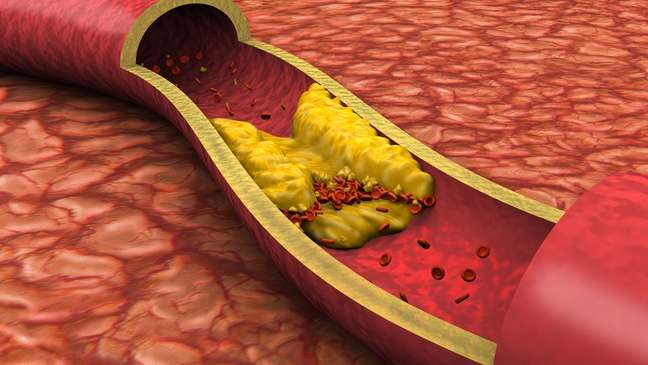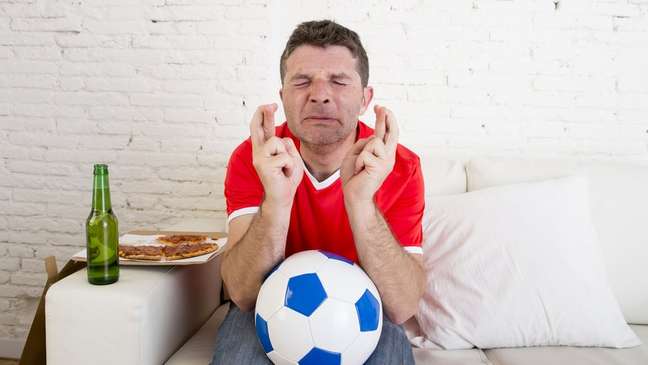Studies show that strong emotions during World Cup matches increase the risk of heart attacks and strokes; for medical visits, announcers are supposed to calm down viewers.

“Sometimes television shows a child in the middle of the game, a ‘hello’, this helps to calm down. But that’s not enough. The announcers have to say directly to the spectators: ‘Calm down!'”, complains cardiologist Fernando Costa, of the ‘Hospital Beneficência Portuguesa, in São Paulo, and Director of Cardiovascular Health Promotion at the Brazilian Society of Cardiology (SBC).
He’s talking about tense World Cup matches and the danger that tension can pose to fans.
“There is a huge increase in heart attacks and strokes (cerebrovascular accidents) during matches. In men, more, because they identify more with football. If you’re very nervous, get up, go out, drink a glass of water” , the doctor recommends.
A new German study, published in the scientific journal The New England journal of medicinerevealed that the incidence of cardiac emergencies among German fans during matches of that country’s selection at the 2006 World Cup increased by an average of 2.66 times.
Men were more affected than women, but in both cases there were more episodes of heart attacks, angina and cardiac arrhythmias.
In 2013, a study by the University of São Paulo (USP) indicated that the occurrence of heart attacks increased by 4% to 8% among Brazilians during World Cup matches.
“The German study is larger, had a long statistical work and produced very faithful numbers. We have some variations from culture to culture, but, in this case, the indices also work for Brazil. Cardiovascular diseases have a similar prevalence in Germany and Brazil,” cardiologist Sergio Timerman, a resuscitation specialist at Incor and coordinator of the Cardiovascular Emergency Training Center at SBC, told BBC News Brasil.
“It may sound like a joke, and for people who don’t care about football, it may sound like bullshit. But it’s serious stuff. Studies have shown that strong emotions are a very important trigger, especially for those who already have heart disease . “
‘have a heart’
For experts, the expression “let there be heart,” cliché notwithstanding, has some basis in biology. According to them, the cardiovascular system is most affected in moments of anxiety, anguish and prolonged stress, such as that decisive match in which the ball insists on not going on goal.
This is because stressful and anxious situations mobilize hormones that prepare the body for fight or flight situations. “When you are anxious about a risky situation, about Brazil losing or being disqualified, you simulate the same effect,” explains endocrinologist Cleo Otaviano Mesa Junior, of the Hospital das Clínicas of the Federal University of Paraná (UFPR) and the Sociedade Brazilian Society of Endocrinology and Metabology (SBEM).
“The hormones released most immediately are adrenaline and norepinephrine, produced by the ganglia on either side of the spine and by the adrenal gland, which sits above the kidneys. They make the heart race, mouth dry, sweat and blood pressure lower. increase.”

These hormones, along with cortisol, a hormone regulator also known as the “stress hormone,” mobilize glucose stores and raise blood pressure so that vital organs — the brain, heart and lungs — work better and faster.
“This is also why people with diabetes can have temporary spikes in blood glucose at these times. The release of glucose into the blood is higher to give more energy to the brain, which needs to be more alert,” she says.
Since the pumping of blood to vital organs depends on the heart, its importance increases at this time. The body reduces blood flow to, for example, the digestive system and urinary system.
“You can see that, at the time of anxiety, a lot of people go hungry and don’t even feel like urinating,” says Mesa Junior.
What if you feel that scary tummy ache? “Bowel movements may also be sped up at that time due to the adrenaline, but digesting food is a lower priority,” according to the endocrinologist.
pressure increase
This control of blood flow in the body, stimulated by adrenaline, causes blood vessels to narrow. For this reason the hands tend to be cold and the look of the very anxious fan, a little paler. The blood can also become thicker, which further increases the resistance in the vessels.
In people prone to heart disease, a situation like this, if it remains constant, can cause blockage of blood flow in the arteries of the heart and, consequently, a stroke or heart arrhythmia, according to Fernando Costa.
“But most common, and most problematic, is that this blood pressure spike ruptures one of the fatty plaques we have inside the heart arteries of the brain. If one of these plaques ruptures, it can close a vessel and even cause death . suddenly,” he explains.
The fatty plaques inside the vessels are “grown” by habits such as smoking and the consumption of alcohol and fats, but they can also be the result of genetic inheritance or diseases such as diabetes.
In addition to all this, changing habits to watch World Cup matches is often the boost that was missing due to a health problem.

“People ask: ‘Why is the World Cup worse?’, we see people who already drink beer, eat fat or drink a lot of coffee,” says Sergio Timerman.
“All of this, in excess, increases the work of the heart. Because we are dealing with a very widespread disease, we have a legion of human beings who don’t know they have it. Sometimes, the first symptom of a heart attack is death.”
The target is out!
Despite the relief, the body doesn’t recover so quickly when the team scores. “The body releases the pressure, but there’s also a release of adrenaline at the time of the goal. The pressure can also build up and some people can even pass out. You have to be psychologically prepared for these emotions,” says Costa.
At the moment of the positive surprise, in addition to adrenaline, neurotransmitters such as dopamine and serotonin are released from the central nervous system, which give a feeling of pleasure and joy.
However, these substances are more concentrated in the brain, since there is no peripheral gland that produces them, says endocrinologist Cleo Mesa Junior.
For Sergio Timerman the increase in adrenaline at the time of a goal is not so acute, and can even be positive for the body. “The tricky thing is that it stays constant. That’s why anguish and anxiety are dangerous,” he says.
Strong emotion or disease?
When making the decision, how do you know if what you are experiencing is ordinary anxiety or an illness with serious consequences?
“If the person’s heart is like a beat, but it’s not accompanied by chest pain, fatigue, or malaise, it’s probably an emotion,” Timerman says.
Be careful if, in addition to the normal symptoms of anxiety – increased sweating, racing heart, dry mouth, cold hands – you also experience chest pain or pressure, cold sweat, nausea or vomiting, or even if your tachycardia does not pass soon . This could be an arrhythmia attack.
If your anxiety is also accompanied by headaches, paralysis or muscle weakness in an arm or leg, slurred speech, or bright spots in your vision (called scotomas), you may be having a stroke.
“If in doubt, leave the game and immediately seek an emergency room to make an assessment. There is the possibility of being treated with drugs and reversing the process,” warns cardiologist Fernando Costa.

preparation for typhus
For experts it is important to remember the obvious: to remain calm during the game, even if it seems impossible.
“In any event that brings us strong emotions, it is important to have the support of family and the presence of friends. Also try not to change your routine too much and avoid excesses – without too much caffeine, too much alcohol, too much fat or too many cigarettes ”, advises Timerman.
If you are taking controlled, strictly speaking, drugs, nothing prevents you from following the selection, but it is important not to forget to take the drug correctly.
If the game is particularly difficult, it is worth talking seriously to your doctor before the game.
Also, cardiologists say, make sure the room you’re watching the game in isn’t filled with people as anxious as you are, or even more so.
“If you have a known illness, be careful. If you don’t have one, find out about your heart condition before entering a community stressful situation. In public places, people become more and more anxious and contaminate each other. There are people than going into a kind of trance,” says Costa.
For some, it might even be worth turning down the TV sound volume if that announcer is making you too nervous. “Broadcasters should be asking for calm, taking a minute to help people relax. But they increase the amount of stress they play.”
“The individual should also think before having extravagant attitudes due to a football match. The important thing is to be healthy to watch the next game,” completes the doctor.
🇧🇷The best content in your email for free. Choose your favorite Terra newsletter. Click here!
Source: Terra
Ben Stock is a lifestyle journalist and author at Gossipify. He writes about topics such as health, wellness, travel, food and home decor. He provides practical advice and inspiration to improve well-being, keeps readers up to date with latest lifestyle news and trends, known for his engaging writing style, in-depth analysis and unique perspectives.








